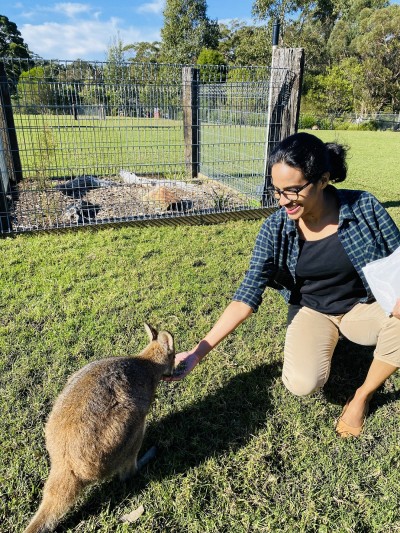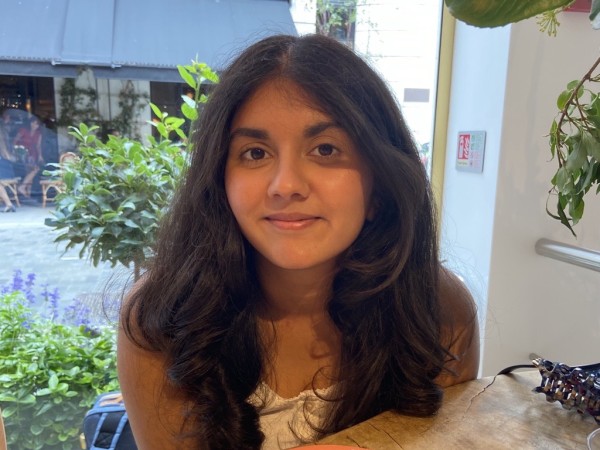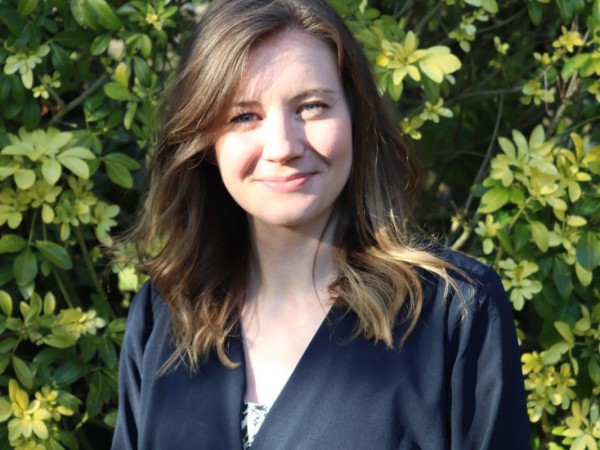
Mamatha Tomson
"Studying abroad as an international student is highly rewarding. I would definitely recommend doing a PhD here to any international students considering their next step."
Course
Civil and Environmental Engineering PhDResearch project
Quantification of pollutant reduction due to the presence of green infrastructure (GI) and its optimised design can improve air quality significantly. Design and implementation of various GI options for improved air quality, especially in urban areas like street canyons has not been explored much. There is a clear need for studies to give GI recommendations for urban environments, including different GI types and configuration strategies. My research is aimed to clarify the role of GI on air quality improvement in urban areas.
Why did you choose to come to Surrey?
As an international student, I wanted to step out of my comfort zone and experience a world-class education at a top university. When I was looking for PhD opportunities, my primary criteria were my supervisor and the research team that I was going to work with. Then I met Professor Prashant Kumar, Founding Director of the Global Centre for Clean Air Research (GCARE) at the University of Surrey. I was impressed with his excellent research with the GCARE team and their vision of ‘clean air for all’.
What was your experience like when you moved here?
When I took a flight to the UK, it was the first time I had left India. I was both excited and nervous to relocate. As expected, the first few weeks were challenging in a new country with new people, but it passed and since then it’s been the best experience.
Why did you choose to study your PhD?
I chose to study for a PhD for a few reasons. Primarily, it’s because I have a passion for research and want to become an expert in my field. Secondly, it’s to enhance my career opportunities: a PhD is essential for an academic job at a university, such as tutor, researcher or lecturer. Thirdly, it’s an excellent opportunity to broaden my network and connect with individuals with the same interests, knowledge and passion.
Why are you passionate about your subject?
Good air quality is a fundamental aspect of quality of life and is an important component of sustainable development. Air pollution is a major environmental hazard, which is responsible for 6.4 million deaths annually. Scientific research emphasises the urgency of controlling air pollution and highlights the complexities of the challenge to meet the latest World Health Organization guidelines. It is evident that cities across the world continue to struggle with poor air quality and with climate change, it is the most important environmental risk for humanity.
Green infrastructure (GI) has been identified as one of the best strategies to reduce atmospheric pollutant concentration. GI offers benefits to public health by diverting and diluting pollution away from people, and via direct capture of pollutants on leaf surfaces through deposition. Quantification of pollutant reduction due to the presence of GI and its optimised design can improve air quality significantly.
There is a clear need for studies to give GI recommendations for urban environments, including different GI types and configuration strategies. My research aims to address these issues through undertaking studies to quantify the pollutant reduction behind hedges in a real street canyon and the pollutant deposition capacity of various green wall species and their relationship with various leaf characteristics. My research provides a reason to initiate evidence-based GI design and implementation recommendations, upon which future research can progress for improved air quality in urban environments.
Which facilities or other resources have you used during your PhD?
GCARE’s air quality lab is a world-class air quality monitoring facility with advanced equipment to monitor fine/ultrafine particulate matter number, concentration and their size distribution, as well as a weather station, a high-precision microbalance, a leaf porometer and data loggers. For data collection during the experimental field campaigns, I used most of the air quality monitoring equipment in the GCARE lab. I have also used some of the state-of-the-art instruments in the MicroStructural Studies Unit (MSSU), the electron microscopy facility at the University.
How has your supervisor helped you to achieve your aims during your studies?
My supervisor is Professor Prashant Kumar, who has been very supportive from the beginning of my PhD. He has provided me with opportunities to be part of larger research projects and offered constant support throughout difficult times during the Covid-19 pandemic; I had to spend a year at the University of Wollongong (UoW), Australia as I have a dual PhD and it was difficult to plan and execute my experiments in two countries with constantly changing travel bans around the world. He provided me the best directions to organise my research during that period. He also motivated me to apply for the Turing scholarship while I was at UoW so that I could win it with his support and encouragement. He is highly encouraging as a supervisor and gives timely guidance for my research. He is a wonderful mentor, and I feel privileged to work with him.

How much opportunity has there been for collaboration during your PhD, either with researchers and academics at Surrey or with external organisations or companies?
My PhD is funded by the University Global Partnership Network (UGPN) joint-dual degree scheme, which is a collaboration between the University of Surrey and UoW. This means I had the opportunity to work with the SMART Infrastructure Facility at UoW from the beginning of my PhD. I also had an opportunity to work with our UoW collaborators through the UGPN-funded SCAN (Street-scale greening for cooling and clean air in cities) project.
Along with other GCARE team members, I worked with Imperial College, London on the INHALE (Health assessment across biological length scales for personal pollution exposure and mitigation) project, funded by the Engineering and Physical Sciences Research Council (EPSRC).
Finally, as part of my research at UoW, I had the opportunity to work closely with the Liverpool City Council, Sydney.
What have you enjoyed most about your PhD?
The great thing about my dual PhD programme is the opportunity I get to explore the world-class research at both Surrey and UoW. I’ve met brilliant people from all over the world, including other PhD students and research fellows. My supervisors at both universities - Professor Prashant Kumar, Professor John Watts, Professor Pascal Perez, Dr Hugh Forehead and Professor Clare Murphy - are very considerate of my wellbeing and help me to explore new possibilities.
Have you lived in University accommodation? What is it like?
Until recently, I was living in University accommodation; I lived in Hazel Farm when I started at Surrey then moved to Battersea Court. There were six students living in my house in Hazel Farm and we were all from different countries. It was a great experience: I met a wide variety of people and learnt so much about different cultures. One of the biggest lessons I learnt is that, despite the numerous things that could divide them, people from all over the world always have a lot in common.
What are the best things about life in general at Surrey?
Over the past four years, Surrey has become my second home and I have lots of wonderful friends and colleagues. You acquire a fantastic education as a student here, which will last a lifetime. The University offers so many different opportunities, so your student experience can be anything you want it to be. This is one of the best things about Surrey.
Also, Guildford is a perfect town to be a student and it’s within easy reach of London.
Do you have any advice for students thinking about postgraduate study?
I would advise anyone considering a PhD at Surrey to trust that the University has so much to offer. I would definitely recommend doing a PhD here to any international students considering their next step. It was a profound realisation for me that every time you go out of your comfort zone you learn so much about yourself and the best things come out of it. Studying abroad as an international student is highly rewarding: it teaches you to be independent, to take accountability for your decisions and to broaden your horizons. It is also a great way to enhance your skill set, gain confidence, improve your cultural awareness and explore the world!
Find out more about our Civil and Environmental Engineering PhD.


